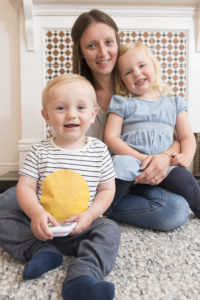 Pregnant women receiving antenatal care in the Women’s Centre at Oxford’s John Radcliffe Hospital (JR) may be asked to take part in a world-first clinical trial to find a vaccine against a common and potentially serious viral infection in babies.
Pregnant women receiving antenatal care in the Women’s Centre at Oxford’s John Radcliffe Hospital (JR) may be asked to take part in a world-first clinical trial to find a vaccine against a common and potentially serious viral infection in babies.
Women are being asked if they would like to take part in a research trial to determine whether an investigational vaccine can protect babies from respiratory syncytial virus (RSV) disease in their first months of life.
The trial – being conducted worldwide in up to 8,000 women – builds on a previous smaller trial in 50 pregnant women which provided initial safety data of the vaccine. No RSV vaccine is available despite 50 years of research.
RSV is a type of virus that causes infections in the lungs and breathing passages in infants, children and adults, with more severe consequences in the very young and older adults.
Symptoms usually start with runny nose and cough and can lead to more serious difficulties with breathing and bronchiolitis. In the long term it can lead to children having wheeze and/or asthma for several years.
Nearly all babies are infected with RSV by their second birthday, and in winter the virus causes epidemics resulting in up to one in six hospital admissions in children less than a year old.
The numbers of children admitted to UK hospitals with RSV continues to rise year on year. Globally, RSV is second only to malaria as a killer of children aged one to 12 months and kills around 200,000 children each year, mostly in lower income countries.
Pregnant women who choose to take part in the study will either receive a placebo or the investigational RSV vaccine, which is designed to generate antibodies that then pass to the baby in the womb, potentially protecting the baby during their first few months of life.
Antibodies are proteins found in plasma, the fluid that makes up most of a person’s blood, and are part of the body’s natural defences against infection.
Antibodies recognise foreign substances, such as germs, and alert the immune system, which attempts to destroy them or stop them from replicating.
Immunisation in pregnancy is already used to protect babies against diseases such as whooping cough, tetanus and influenza, and the investigators hope that this investigational RSV vaccine will be similarly effective at preventing RSV.
Healthy pregnant women from Oxfordshire due to give birth between September and December are being asked if they want to take part, as babies born at these times are at higher risk of RSV infection. Participants have an injection at 28 to 36 weeks.
Doctors and nurses at Oxford anticipate recruiting 15 women between August and December this year and the same period next year to take part in the trial, which is being funded by Novavax Inc, a clinical-stage biotechnology company based in the United States.
The study is being carried out in Oxfordshire by the University of Oxford and Oxford University Hospitals NHS Foundation Trust, which manages the JR.
It has been welcomed by the Norris family, of Abingdon, Oxfordshire, who experienced RSV disease when their four-month-old son Sebastian was hospitalised at the JR with bronchiolitis in October last year.
The RSV virus is spread through tiny droplets of liquid from the coughs or sneezes of someone who’s infected.
M other Claire said: “When I picked him up from his morning sleep, he wasn’t his normal self. We thought ‘we have to take him to A&E’.
other Claire said: “When I picked him up from his morning sleep, he wasn’t his normal self. We thought ‘we have to take him to A&E’.
“I thought they would say he needs a blue inhaler but as soon as we got to A&E it was different straight away. I remember ringing my mum and crying and saying ‘I think it’s bad’.”
Sebastian was admitted to a children’s ward and, six hours later, transferred to children’s intensive care, where he remained for three days on breathing support.
Claire said: “I was fine until I saw my baby and I just broke down. At that time I thought the worst.”
“It was the worst week of my life, it literally feels so long. We ended up staying at the hospital and taking it in turns to be with him.”
She said: “Through your pregnancy and even now, you think about big things that get the news like meningitis, you never think something as simple as a respiratory infection can be so damaging.”
Chief investigator Dr Matthew Snape, of the university’s Oxford Vaccine Group, said: “As a paediatrician I’m very excited to be involved in a study to prevent an infection that is so common and causes so much distress.
“Most children in the UK will be infected with RSV in their first winter, and it is the most common reason for children being admitted to hospital for lung infections.
“An effective RSV vaccine given to pregnant women could prevent thousands of babies a year having to be admitted to hospital in the UK and around the world and has the potential to save hundreds of thousands of lives.
“It’s great to see Oxford University Hospitals NHS Foundation Trust and the University of Oxford being involved in this international effort.”
The study is supported by the NIHR Clinical Research Network Thames Valley and South Midlands (CRN) and the NIHR Oxford Biomedical Research Centre, which are part of the National Institute for Health Research, a Department of Health-funded organisation that provides funding to get trials up and running in the health service.
To find out more visit www.ovg.ox.ac.uk or www.osprea.ox.ac.uk or call 01865 611400.